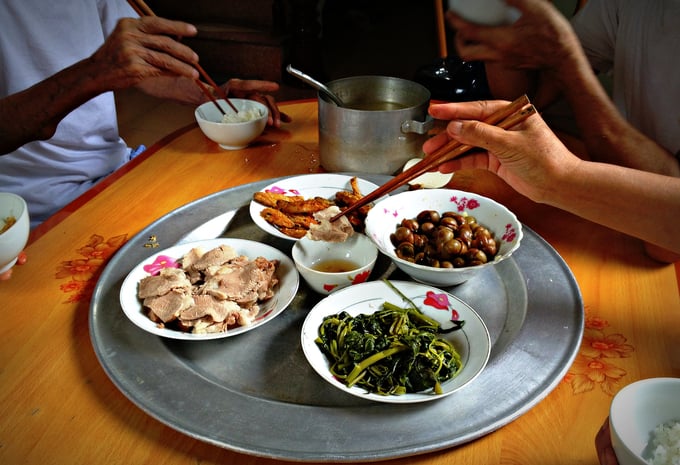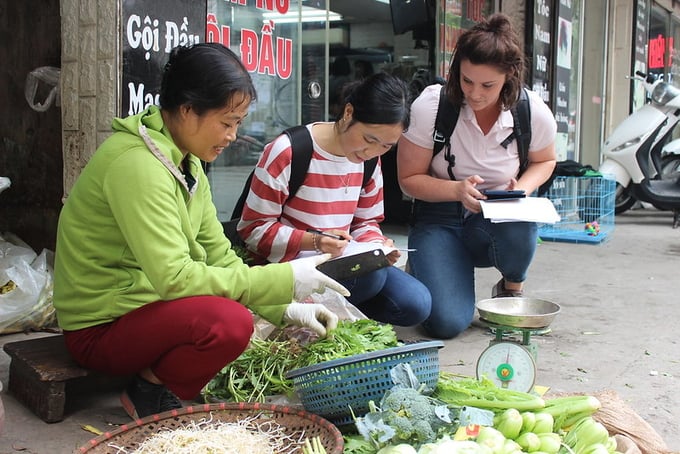December 5, 2025 | 12:12 GMT +7
December 5, 2025 | 12:12 GMT +7
Hotline: 0913.378.918
December 5, 2025 | 12:12 GMT +7
Hotline: 0913.378.918

Revamping communication about the food supply chain will help consumers make safe decisions for themselves and their families. Photo: ILRI.
On December 5th, the Vietnam Agricultural Newspaper, in partnership with the International Livestock Research Institute (ILRI), hosted a training seminar under the theme "Enhancing communication on food safety: Connecting researchers, journalists and communities in the animal-origin food value chain".
Transparency in information to prevent confusion
As part of the seminar, a roundtable discussion titled "Creative approaches in food safety communication" was held. During this session, Dr. Luu Quynh Huong, a food safety expert from the Veterinary Institute, shared insights on how to communicate scientific data to consumers in a way that is both transparent and useful.
Dr. Huong explained that in the field of food safety, microbial and chemical risks, such as the presence of antibiotic residues and hormones, are often investigated through specific research projects, scientific collaborations or thematic studies. The findings from these studies are typically published in both domestic and international scientific journals.
However, one of the key challenges is ensuring that this complex scientific information is communicated in a clear and accessible way to the general public, allowing consumers to make informed decisions about the food they consume. As a result, Dr. Huong highlighted three essential criteria when communicating scientific information: providing accurate details, selecting relevant content and using simple and easily understandable language.
The expert from the Veterinary Institute shared practical examples from over 20 years of research on Salmonella bacteria. She explained that, despite years of study, the research findings on the contamination levels of Salmonella have remained consistently high. Around 30-80% of meat samples collected from the market are found to be contaminated with Salmonella.
Dr. Huong pointed out that although there are over 2.600 species of Salmonella, not all of them cause foodborne illnesses. Therefore, it is crucial to convey information in a comprehensive and accurate way so that the public can fully understand the situation. This approach helps to prevent unnecessary panic or confusion among consumers, enabling them to make informed decisions based on clear and precise information.
In response to a question from journalist Thuy Khanh from Poultry Breeder - Poultry World Magazine, regarding the transparency of information and access to official food safety sources, Dr. Huong highlighted an important issue. She pointed out that, at present, the electronic portals for food safety information in Vietnam are still not easily accessible to the general public.
She explained that critical data, such as statistics on food poisoning incidents, the number of people hospitalized or who have died due to foodborne illnesses and risk factors (such as age groups most vulnerable to these illnesses or the impact of weather conditions), are mainly published in news articles. However, Dr. Huong emphasized that it is necessary for local government portals and the health sector to publicly release this information online in an accessible format.

The collaboration between scientists and journalists will help spread the message of food safety. Photo: ILRI.
In further discussing the gap between scientific research and how the public accesses information, journalist Duong Dinh Tuong, a reporter for Vietnam Agricultural Newspaper, emphasized: "In order to change producers, we must first change the mindset of consumers".
He argued that the leniency of consumers has created a permissive environment for producers. When consumers focus only on cheap prices and attractive packaging without considering the product’s origin or how it is made, they are unknowingly contributing to the spread of unsafe food.
Over the years, Vietnam Agricultural Newspaper has continually expanded its reach across various digital platforms, aiming to spread crucial information about the industry, including food safety.
"Although traditional media must compete with social media in terms of its ability to spread information quickly, the strength of journalism still lies in its depth and the authenticity of the information it provides". Rather than viewing social media as competition, journalist Duong Dinh Tuong encourages his peers to leverage these platforms to "market" their articles and reach a larger audience.
In addition to his journalistic work, Duong Dinh Tuong is the administrator of the Vietnam Today Facebook group, which has more than 14.000 members and he is also an active participant in around 10 groups focused on safe agriculture. Among these, the Sustainable Agriculture Alliance group has garnered nearly 70.000 members.
He stressed that journalists should not keep information to themselves as though it were an exclusive asset. By sharing information freely, utilizing valuable content and engaging with public opinion, journalists can significantly influence the way people think and help shift the public’s mindset on important issues.
Translated by Phuong Linh

(VAN) As of 2025, the ASEAN region has a total of 69 ASEAN Heritage Parks recognized across its 10 member states. Among them, Viet Nam contributes 15 ASEAN Heritage Parks.

(VAN) Yok Don National Park has high biodiversity with numerous endemic plant and animal species, and it is also the only dipterocarp forest ecosystem conservation area in Viet Nam.

(VAN) Viet Nam and Brunei signed two important MOUs on fisheries and IUU, expanding cooperation in agriculture, the environment, and Halal exports, aiming to substantively implement joint projects.

(VAN) The Viet Nam Coconut Association worked with the International Finance Corporation (IFC) and businesses to promote the supply chain, enhance competitiveness, and develop the coconut industry sustainably.
![Hue aims for Net Zero: [2] Pioneering low-emission tourism](https://t.ex-cdn.com/nongnghiepmoitruong.vn/608w/files/huytd/2025/12/04/0633-dulichzero-4-095634_236-161125.jpg)
(VAN) The ancient capital of Hue has developed Net Zero tourism products and models, aiming to reduce carbon emissions and pioneer the establishment of Viet Nam's green tourism destination.

(VAN) C.P. Viet Nam has announced the successful completion of its goal to plant 1.5 million trees during the 2021-2025 period, a key milestone within company's long-term ESG strategy and its roadmap for emission reduction.

(VAN) This is an initiative of MAE aimed at creating a unified coordination mechanism to implement agricultural cooperation programs with developing countries.